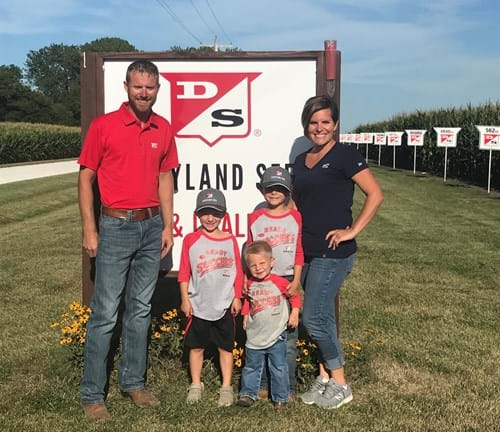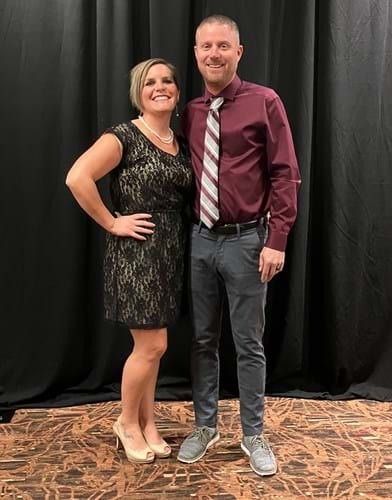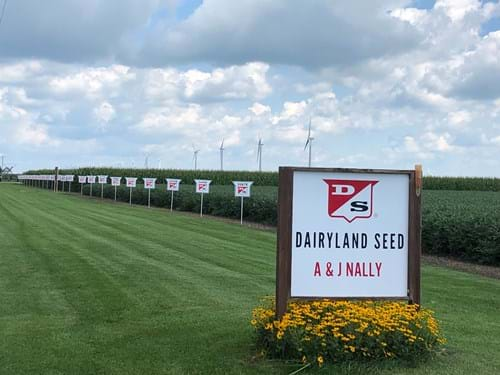For Jordan Nally, Seed Sales is About Creating Chemistry
BY Dairyland Seed
Have you heard the one about the chemist who met the farmer? They bonded. Bad pun? Probably. But for Jordan Nally, a chemist turned seed dealer, it’s quite a good story.
In 2013, Jordan left her stable job analyzing the ways in which substances interact with one another for the much less certain world of seed sales. Not only that, she also did it in Benton County, Ind., one of the most competitive areas in the state for seed sales, chock full of rival seed brand dealers.
Jordan explains. “We live in Fowler. It’s all ag around here. One day about 10 years ago, a seed rep who I had known as ‘Uncle Steve’ since I was about four years old, no actual relation, approached my dad and asked if he knew anyone in our community that might help him with seed sales for Brodbeck, and my dad was like, well, my daughter just married a Benton County boy so you might go ask them.

Brothers Cole, Clay, Jace (center left to right) flanked by mom and dad in 2019.
“I was working full-time in a chemistry pharmaceutical lab, and my husband, Aaron, was working full-time for Dow, and we had a newborn baby. But Uncle Steve said he just wanted us to introduce him to area farmers. So we did. Aaron went to farms and made introductions while I helped with paperwork. A year later, Aaron and I were pregnant with our second when Uncle Steve called and said, ‘you know, what if you sold full-time?’”
No way was Jordan quitting her job. Not for sales. Not for uncertainty. Not with a baby on the way. More to the point, her reaction to such a career change was, “Uncle Steve has lost his mind!”
Aaron didn’t exactly want the job either. “Sales is not my thing. I’m not much for knocking on strangers’ doors and trying to sell them stuff,” he says.
At this juncture, Uncle Steve had what a lover of plants and puns might say was the germ of an idea. He got Brodbeck’s management team, Jim Engelberth and Doug Rice, to stop by and paint a picture of what selling seed could look like. They shared some thought-provoking scenarios with Jordan.
Two weeks before she was scheduled to return to her pharma job from maternity leave with their second son, she told Aaron that she had changed her mind. She was going to sell seed.
“You know, having the flexibility to stay home with my kiddos was a huge selling point for me,” Jordan says. “We ad our two oldest boys 20 months apart, so I had used up a lot of my sick time with the first one, and after our second was born one of them got sick right before my leave ended. I didn’t have enough days to stay home with him, and I was stressed thinking about how to keep on managing things while back at the lab. So yeah, it was a big reason.”
But it wasn’t the only reason. Jordan believed a job in agriculture could help provide for her family. She had a good support system in place already. Aaron had a good job and health insurance. Her dad is a fifth-generation farmer, and Aaron’s family goes back more than a century on their farm. Her Uncle Steve would be there for her too. It just felt like a safe enough decision.

The happy couple stops to pose for a moment during the 2023 key producer summit.
In the early years of selling, Jordan cut her teeth on her dad’s farm. He was her sounding board, and he let Jordan experiment with plots. “Except he didn’t plant 100 percent Brodbeck my first year. Or my second. Farmers are loyal!” she laughs. “He had to get used to the product.”
Nevertheless, relationships were her first foot in the door. She started with people who knew her or her family. She immersed herself in the product lineup, spending countless days and weeks studying. She learned sales techniques from Uncle Steve. She mastered driving a forklift to unload and load seed. She quickly became adept at backing trailers into tight spaces.
Still, there was a lot to learn, even for someone raised on a farm. “My dad wasn’t one to sit us kids down to talk about which hybrids he was planting and why. It was more like, ‘okay we’re picking up rocks tomorrow,’” she laughs.
But she grew to understand her dad’s approach to farming. She saw differences on Aaron’s family farm and learned an important sales lesson early on: Farming can look the same operation to operation, but no two farms are alike, and some are completely different.
She learned to listen well. “You have to know the farmer’s real need,” she says. “He might say he wants yield but what he really wants is a stalk that stands strong in fall, a factor in yield.”
This is where chemistry – the social science – comes into play. Her business is about building rapport and earning trust by demonstrating product knowledge and showing empathy.
Looking back on her first 10 years, she is certain she made the right decision.
Her product lineup is as strong as it’s ever been. She walks onto farms full on confidence. Lately, DS-5250AM™, DS-5144Q™ and DS-4878AM™ have been making customers happy. Her soybeans have always been stellar performers.

Jordan and Aaron’s show plot, located at the front of their property in Fowler, Ind.
Jordan appreciates the freedom to run her kids to and from school or stay and volunteer. Her farmers know her boys – Jace, Cole and Clay – and they don’t mind them tagging along on sales calls or deliveries if it comes to that.
Sure, there are some long days traveling farm to farm that might end with Jordan carrying a sleeping 5-year-old through a field. But that’s just agriculture, people carrying more than their own weight.
“I love my customers. And we’ve made new friends with other dealers, some with kids the same ages as ours, even pregnant at the same time,” Jordan says. “We visit them. They stay with us. We go camping together. I mean, it is more like family than co-workers. I don’t know why it’s more personal than any other job I’ve ever had. But it is just so nice.”
